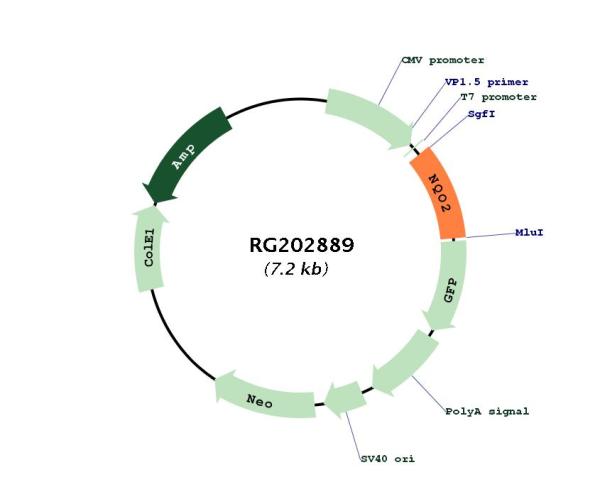NQO2 (NM_000904) Human Tagged ORF Clone
CAT#: RG202889
- TrueORF®
NQO2 (tGFP-tagged) - Human NAD(P)H dehydrogenase, quinone 2 (NQO2)
ORF Plasmid: DDK
Lentiviral Particles: DDK DDK w/ Puro mGFP mGFP w/ Puro
AAV Particle: DDK
"NM_000904" in other vectors (6)
Specifications
| Product Data | |
| Type | Human Tagged ORF Clone |
| Tag | TurboGFP |
| Symbol | NQO2 |
| Synonyms | DHQV; DIA6; NMOR2; QR2 |
| Vector | pCMV6-AC-GFP |
| E. coli Selection | Ampicillin (100 ug/mL) |
| Mammalian Cell Selection | Neomycin |
| Sequence Data |
>RG202889 representing NM_000904
Red=Cloning site Blue=ORF Green=Tags(s) TTTTGTAATACGACTCACTATAGGGCGGCCGGGAATTCGTCGACTGGATCCGGTACCGAGGAGATCTGCC GCCGCGATCGCC ATGGCAGGTAAGAAAGTACTCATTGTCTATGCACACCAGGAACCCAAGTCTTTCAACGGATCCTTGAAGA ATGTGGCTGTAGATGAACTGAGCAGGCAGGGCTGCACCGTCACAGTGTCTGATTTGTATGCCATGAACTT TGAGCCGAGGGCCACAGACAAAGATATCACTGGTACTCTTTCTAATCCTGAGGTTTTCAATTATGGAGTG GAAACCCACGAAGCCTACAAGCAAAGGTCTCTGGCTAGCGACATCACTGATGAGCAGAAAAAGGTTCGGG AGGCTGACCTAGTGATATTTCAGTTCCCGCTGTACTGGTTCAGCGTGCCGGCCATCCTGAAGGGCTGGAT GGATAGGGTGCTGTGCCAGGGCTTTGCCTTTGACATCCCAGGATTCTACGATTCCGGTTTGCTCCAGGGT AAACTAGCGCTCCTTTCCGTAACCACGGGAGGCACGGCCGAGATGTACACGAAGACAGGAGTCAATGGAG ATTCTCGATACTTCCTGTGGCCACTCCAGCATGGCACATTACACTTCTGTGGATTTAAAGTCCTTGCCCC TCAGATCAGCTTTGCTCCTGAAATTGCATCCGAAGAAGAAAGAAAGGGGATGGTGGCTGCGTGGTCCCAG AGGCTGCAGACCATCTGGAAGGAAGAGCCCATCCCCTGCACAGCCCACTGGCACTTCGGGCAA ACGCGTACGCGGCCGCTCGAG - GFP Tag - GTTTAA >RG202889 representing NM_000904
Red=Cloning site Green=Tags(s) MAGKKVLIVYAHQEPKSFNGSLKNVAVDELSRQGCTVTVSDLYAMNFEPRATDKDITGTLSNPEVFNYGV ETHEAYKQRSLASDITDEQKKVREADLVIFQFPLYWFSVPAILKGWMDRVLCQGFAFDIPGFYDSGLLQG KLALLSVTTGGTAEMYTKTGVNGDSRYFLWPLQHGTLHFCGFKVLAPQISFAPEIASEEERKGMVAAWSQ RLQTIWKEEPIPCTAHWHFGQ TRTRPLE - GFP Tag - V |
| Restriction Sites |
SgfI-MluI
Cloning Scheme for this gene
Plasmid Map

|
| ACCN | NM_000904 |
| ORF Size | 693 bp |
| OTI Disclaimer | The molecular sequence of this clone aligns with the gene accession number as a point of reference only. However, individual transcript sequences of the same gene can differ through naturally occurring variations (e.g. polymorphisms), each with its own valid existence. This clone is substantially in agreement with the reference, but a complete review of all prevailing variants is recommended prior to use. More info |
| OTI Annotation | This clone was engineered to express the complete ORF with an expression tag. Expression varies depending on the nature of the gene. |
| Product Components | The ORF clone is ion-exchange column purified and shipped in a 2D barcoded Matrix tube containing 10ug of transfection-ready, dried plasmid DNA (reconstitute with 100 ul of water). |
| Reconstitution | 1. Centrifuge at 5,000xg for 5min. 2. Carefully open the tube and add 100ul of sterile water to dissolve the DNA. 3. Close the tube and incubate for 10 minutes at room temperature. 4. Briefly vortex the tube and then do a quick spin (less than 5000xg) to concentrate the liquid at the bottom. 5. Store the suspended plasmid at -20°C. The DNA is stable for at least one year from date of shipping when stored at -20°C. |
| Reference Data | |
| RefSeq | NM_000904.2 |
| RefSeq Size | 976 bp |
| RefSeq ORF | 696 bp |
| Locus ID | 4835 |
| UniProt ID | P16083 |
| Cytogenetics | 6p25.2 |
| Domains | Flavodoxin_2 |
| Gene Summary | This gene encodes a member of the thioredoxin family of enzymes. It is a cytosolic and ubiquitously expressed flavoprotein that catalyzes the two-electron reduction of quinone substrates and uses dihydronicotinamide riboside as a reducing coenzyme. Mutations in this gene have been associated with neurodegenerative diseases and several cancers. Alternative splicing results in multiple transcript variants. [provided by RefSeq, Mar 2014] |
Documents
| Product Manuals |
| FAQs |
| SDS |
Resources
Other Versions
| SKU | Description | Size | Price |
|---|---|---|---|
| RC202889 | NQO2 (Myc-DDK-tagged)-Human NAD(P)H dehydrogenase, quinone 2 (NQO2) |
USD 300.00 |
|
| RC202889L1 | Lenti ORF clone of Human NAD(P)H dehydrogenase, quinone 2 (NQO2), Myc-DDK-tagged |
USD 600.00 |
|
| RC202889L2 | Lenti ORF clone of Human NAD(P)H dehydrogenase, quinone 2 (NQO2), mGFP tagged |
USD 600.00 |
|
| RC202889L3 | Lenti ORF clone of Human NAD(P)H dehydrogenase, quinone 2 (NQO2), Myc-DDK-tagged |
USD 600.00 |
|
| RC202889L4 | Lenti ORF clone of Human NAD(P)H dehydrogenase, quinone 2 (NQO2), mGFP tagged |
USD 600.00 |
|
| SC319150 | NQO2 (untagged)-Human NAD(P)H dehydrogenase, quinone 2 (NQO2) |
USD 300.00 |
{0} Product Review(s)
Be the first one to submit a review






























































































































































































































































 Germany
Germany
 Japan
Japan
 United Kingdom
United Kingdom
 China
China

